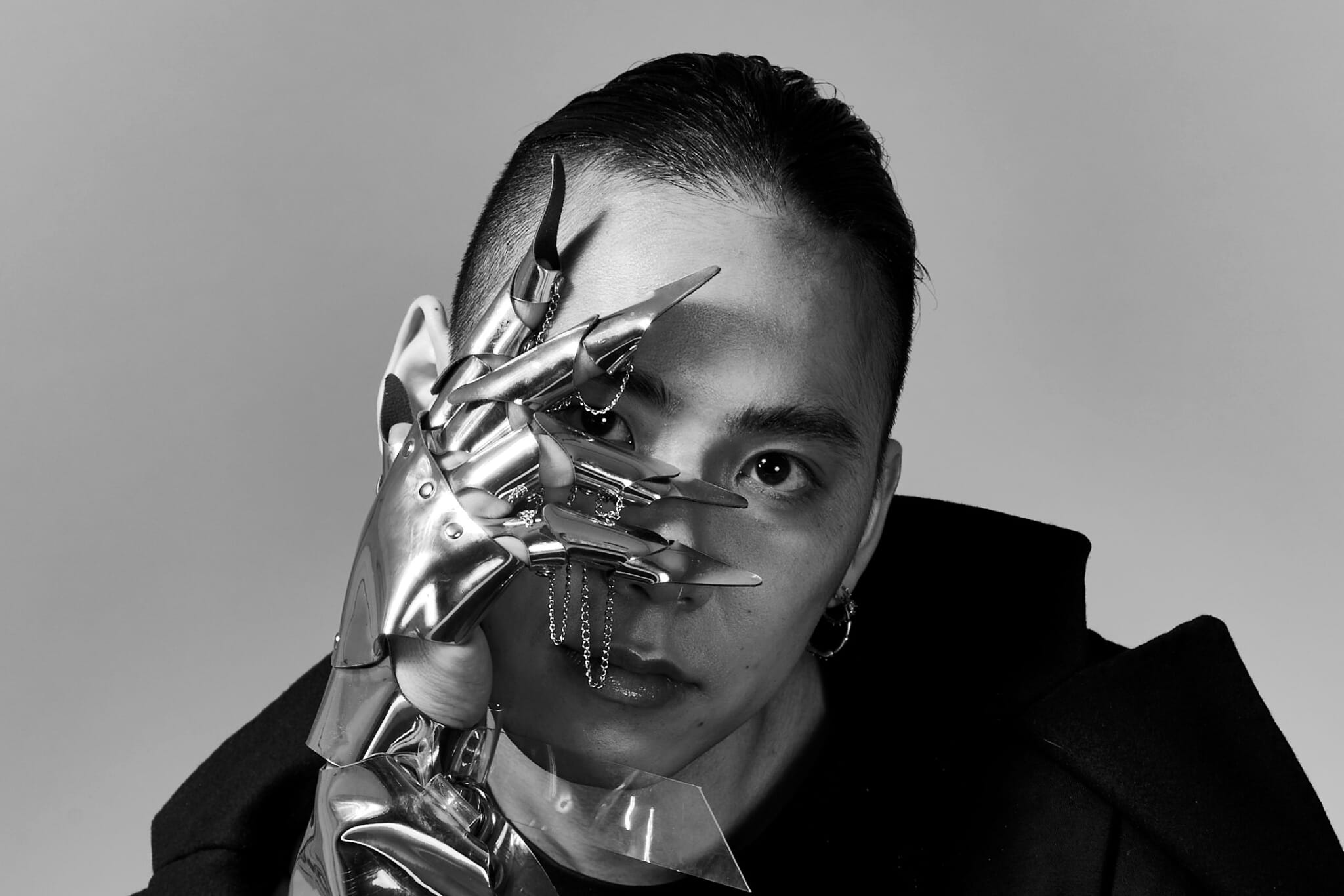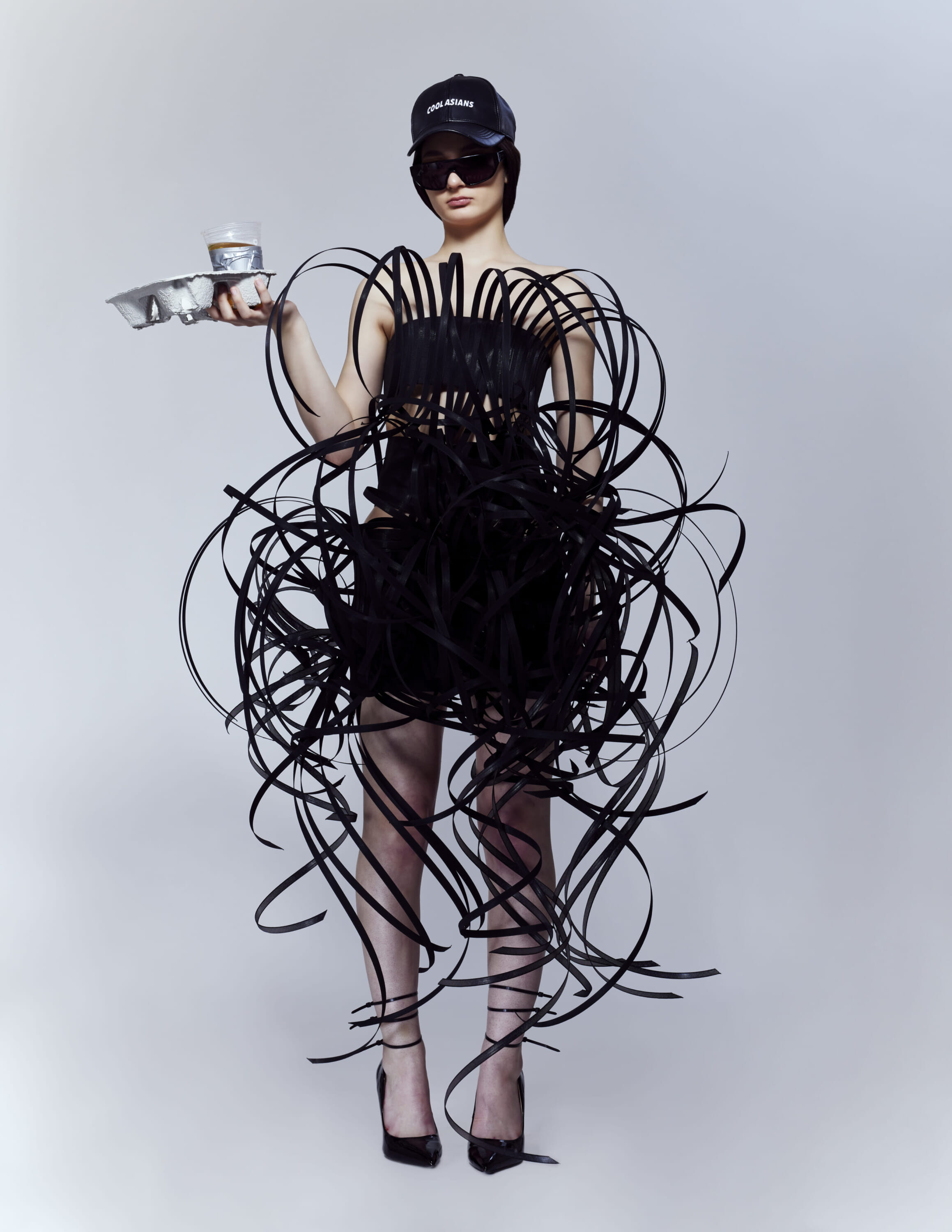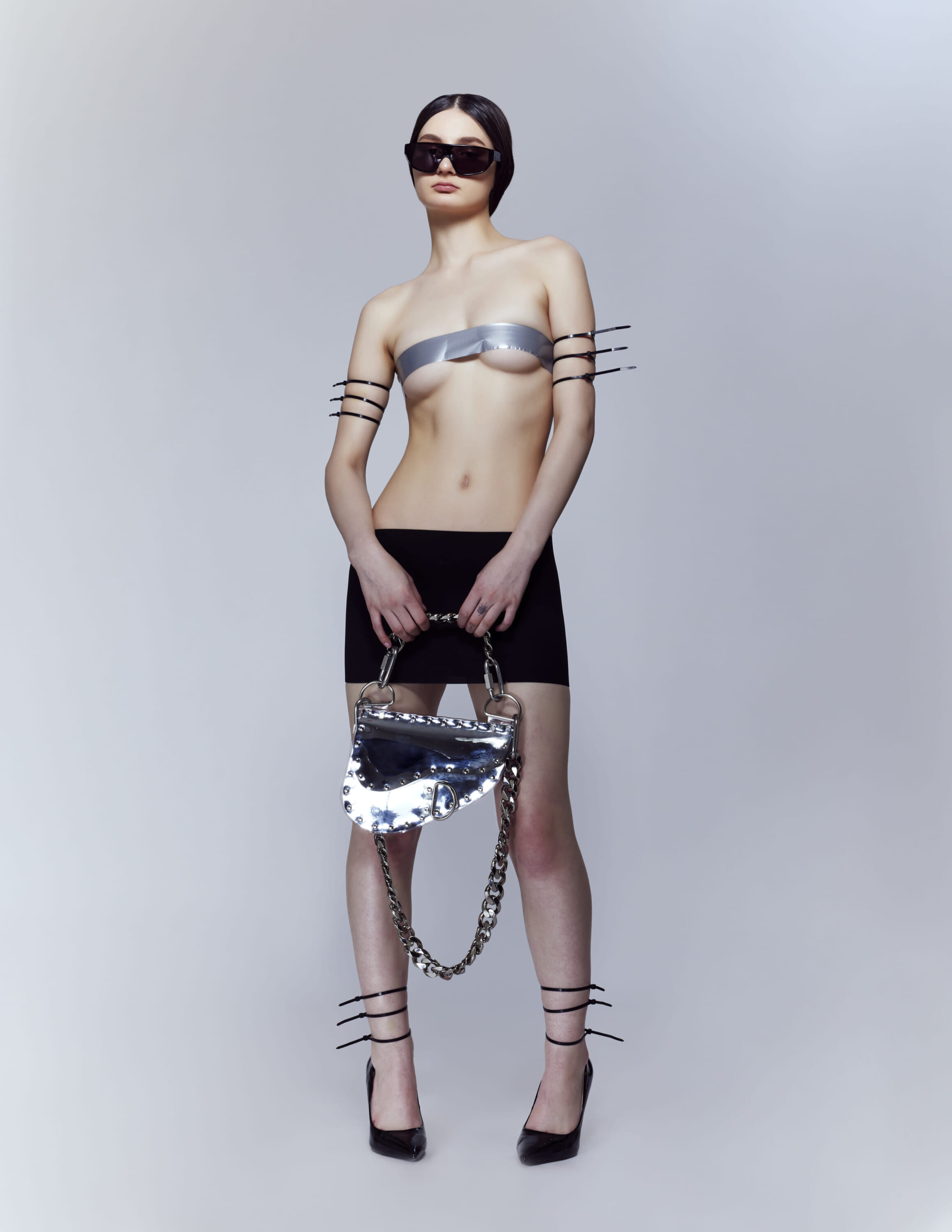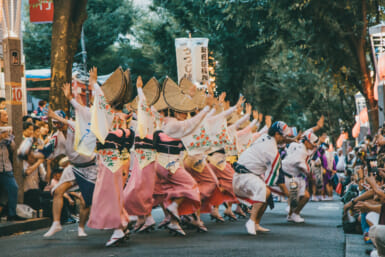Sho Konishi comfortably embodies two contrasts: the urban and the rural. His energy, drive and talent have landed him on the biggest fashion runways in the world, but his soul will forever be claimed by his hometown in rural Kochi Prefecture. This duality has not only translated across to his fashion designs, which have gained worldwide attention, but has also given Konishi a purpose beyond his own work.
Since graduating in 2019 from Parsons School of Design, New York City’s prestigious fashion school boasting alumni such as Anna Sui, Tom Ford, and Marc Jacobs, Konishi has been working non-stop. Luckily for us, the designer found a sliver of free time in his packed schedule to meet with TW in Tokyo and discuss his journey in fashion.
From the moment we sit down to chat, Konishi’s passion for his work overflows as he pours out his life story. Holding back is not a part of his brand.
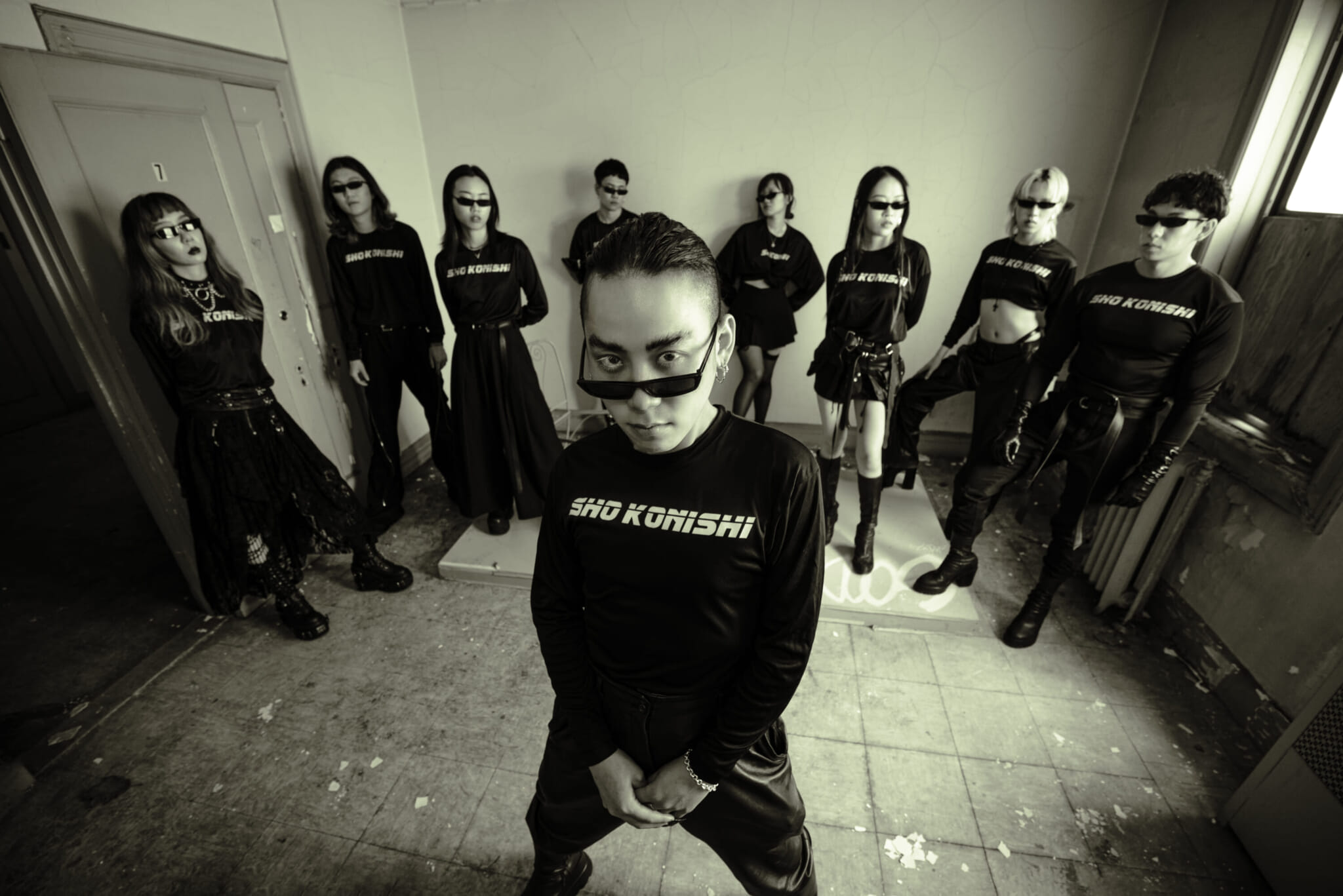
Where a Fashion Designer Grows
Though Konishi has studied in the greatest fashion capitals of the world, graduating from Tokyo Mode Gakuen College of Fashion & Design, Paris College of Art and New York City’s Parsons, his work can never be separated from his origin. “I always tell people, even in Japan, that I’m from Kochi,” he says. “It’s very important because most of my designs are inspired by its nature. For me, nature means Kochi.”
He isn’t the only notable figure from the area to have fallen in love with Kochi’s flora and fauna, as Tomitaro Makino, often referred to as the father of Japanese botany, also hailed from the prefecture. “Makino talks about nature, about the forest and the plants, in a very Kochi way,” Konishi says, laughing as he recalls spending time in the famed botanist’s now public garden.
This deep love of his home’s natural landscape has followed Konishi throughout his life as a designer, even to the point of almost ending his career after he discovered just how polluting the fashion industry can be. It was during his time studying in Paris in 2017 that he discovered the word “sustainable” and all that it entailed. “That was my first time hearing about sustainability, and my English wasn’t good,” he says. “I didn’t know what was going on.”
He learned quickly, though, and what he discovered did not sit well with him. The fashion industry accounts for roughly 10% of global carbon dioxide output, according to Bloomberg, and fashion waste from fast fashion is at an all-time high, with clothes made of cheap material filling up landfills across the world.
For a nature lover like Konishi, this news was shocking. “I love nature, and the fashion industry is the worst,” he explains.“At that time, I felt like I didn’t want to be a fashion designer. I was just lost.” Ultimately, though, he decided that rather than walk away, he would work to change things from the inside.
Konishi’s designs are a celebration of nature. Using technology and sustainable materials, he manages to create something both organic in aesthetic and highly modern in composition. And it isn’t just nature alone that has captured his imagination but its relation to the human experience. “Fashion for me is about human behavior, society, human life. How we behave in this era, right now, today — that is fashion for me,” Konishi says.
If the state of the world right now comes down to a disconnect between humans and nature, then Konishi seeks to dispel that and find a way to integrate the two harmoniously. This came to a head in 2019 in his spring 2020 Garden of Eden: Botanical Masterpieces collection presented as part of his studies at Parsons. For the collection, he interwove organic materials such as leaves, petals and grass with the human body. Konishi published a book of the same name relating to the collection, and it acts as an educational guide on sustainable fashion.
His extensive knowledge of the topic has led to new opportunities, including being asked to act as a special advisor for Re.Uniqlo, the clothing brand’s recycling initiative. He was also invited to speak during a panel discussion on sustainability at 2023 A/W Rakuten Fashion Week Tokyo.

Weaving Between Cultures
Konishi is a designer constantly living between different worlds. Though part of the same country, Tokyo — Konishi’s first step into an urbanized life — was a far cry from Kochi. “People in Tokyo are different,” he says. “They have dreams, they have desires and they are judgmental of one another, in good ways and bad ways too.”
He continues, “Moving to Tokyo, I met so many people from the countryside who had a dream and moved there. Sometimes they succeed, and sometimes they fail. Living in Tokyo taught me that if you want to be successful, work hard, work harder. It’s a kind of military energy.”
The move to New York then opened up an entirely new mindset for Konishi. When asked what he learned there that he hadn’t in Tokyo or Paris, he responds, “Definitely to smile,” while showcasing that exact skill.
“In New York, everyone works hard, but they are being themselves. They were teaching me so much about me being happy overbeing a workaholic. That perspective was so different.”
Konishi has gone on to have huge success both in Japan and the U.S. In Japan, he designed the costumes for the Tokyo 2020 Paralympic Opening Ceremony, an amazing achievement for the then-29-year-old. Overseas, he has been designing custom pieces that have been worn by some of pop’s biggest stars, including Beyoncé, Lizzo and Chloe x Halle, as well as by actor Nico Tortorella, whom Konishi now considers a good friend. Many clients have been drawn to his Android collection.
“I had the idea to recreate Mugler’s robotic look but for a performance — for music and dancing,” he explains. “We wanted it to be body positive as well, including adjustable sizes.” He adds, “That collection really changed my career.
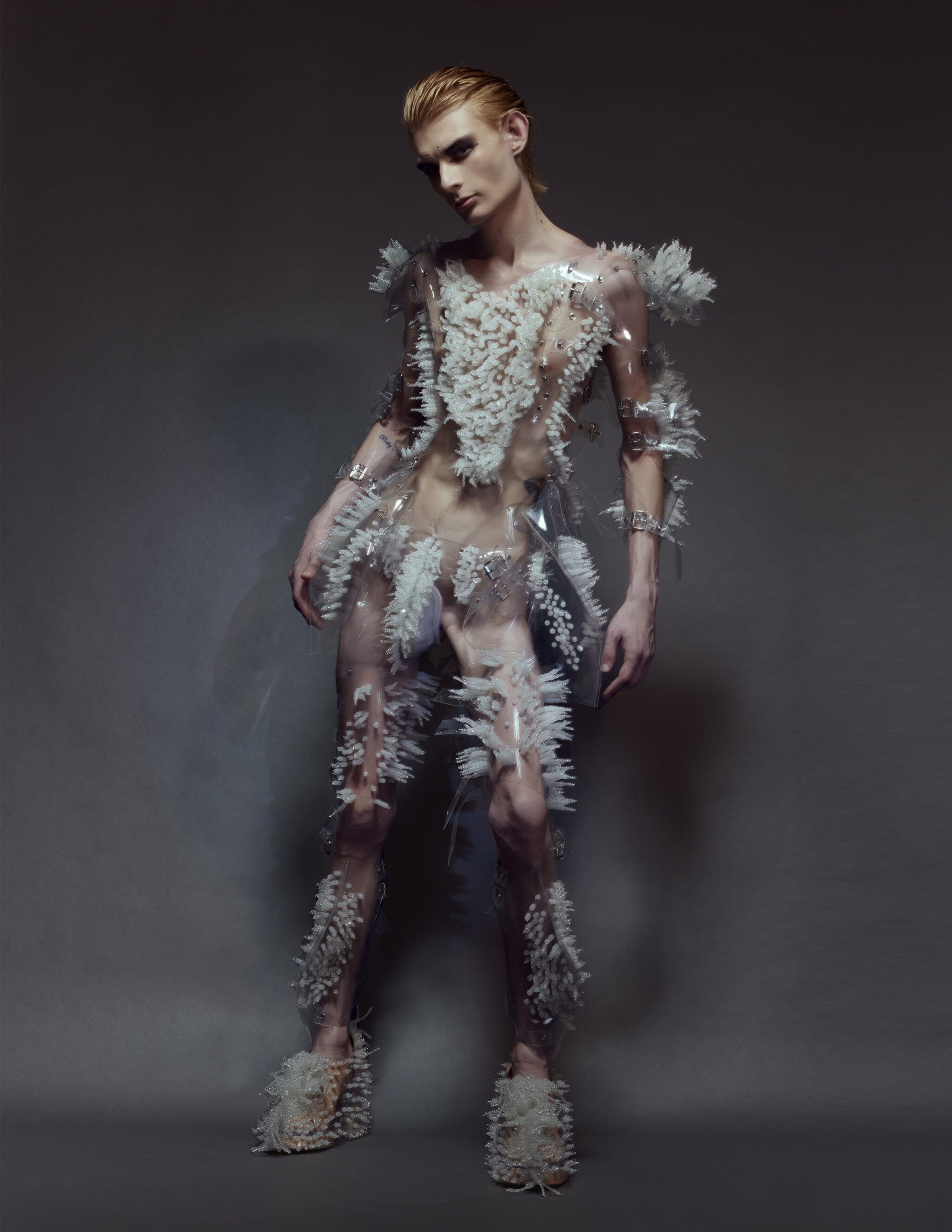
Paying It Forward
Having achieved a dream he always thought was out of reach, Konishi has formulated new goals that are much more future-forward. It isn’t so much his designs that he cares about passing on but his experience,which is why he created Sho_Konishi_Design_Lab to help other Japanese fashion students reach out to and prepare for their own international applications.“My knowledge is precious because I have been to so many different schools. I need to share my studies: That’s why I made my own online-based educational program,” he explains.
By creating a network of Japanese designers around the globe, Konishi can ensure that his goal of inspiring change continues.“I want to create a history. Because I am an individual, there is less opportunity for me to succeed alone, but as a group, maybe we can change the world,” he says. “Studying sustainability for so long, my final answer was education so the knowledge can continue.”
The designer’s diverse and global life leaves us wondering — where is home for Konishi right now? “I think I’m going to settle in New York for a while,” he responds, then adds with a laugh, “But my spirit is definitely in Kochi. My soul is there. I think I want to die in Kochi.” Though we hope this is a distant thought for now, we can’t help but be struck by Konishi’s words, which illustrate just how deeply he is tied to his roots — roots he’s fighting to protect in a way that will live on far into the future.
Find Konishi and his designs at sho-konishi.com and on Instagram at @sho_konishi.
This article was originally published in the TW September-October 2023 issue

